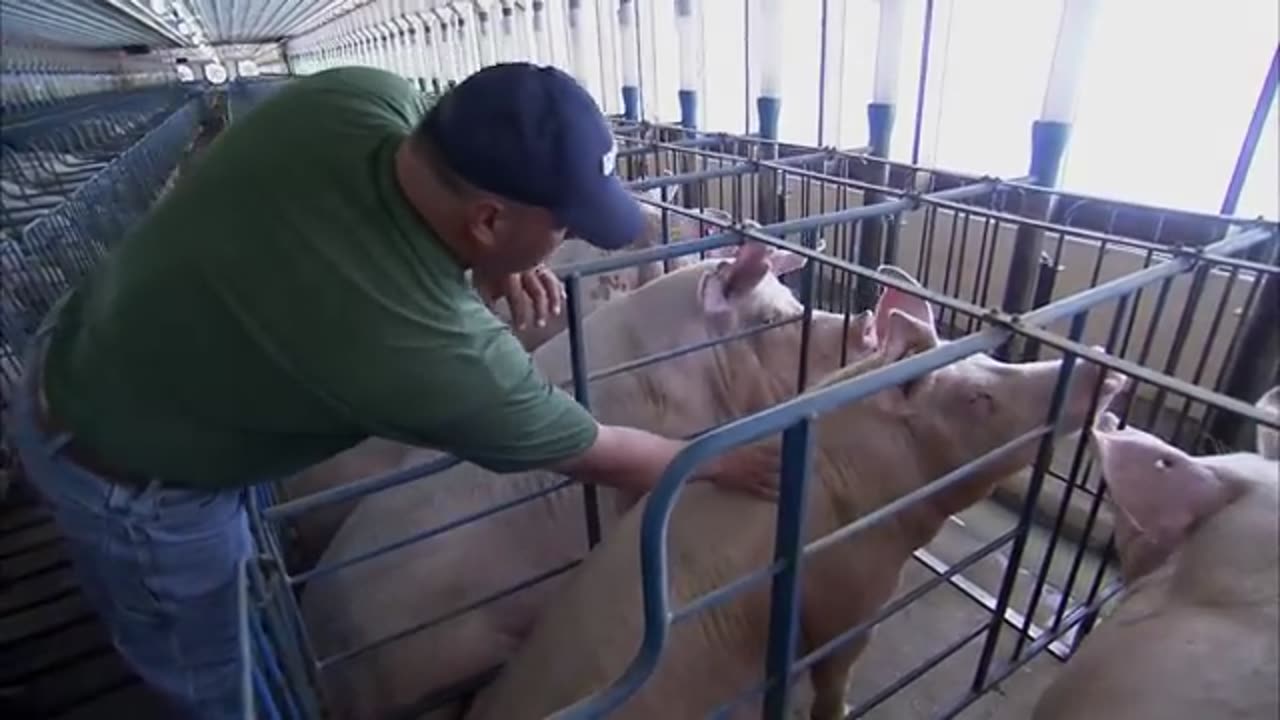Premium Only Content

The Inhumane Reality of Gestation Crate Abuse | cruelty farm
Gestation crate abuse is a significant animal welfare issue prevalent in industrial pig farming. Gestation crates, also known as sow stalls, are small metal enclosures used to confine pregnant sows for the duration of their pregnancies, which last about 114 days. These crates are so narrow that the sows cannot turn around or move comfortably, restricting their natural behaviors and causing immense physical and psychological distress.
The primary purpose of gestation crates is to maximize space efficiency and minimize labor costs in factory farming. However, this confinement results in severe welfare concerns. Sows in these crates often suffer from muscle and joint disorders due to lack of movement, and the inability to engage in natural behaviors such as nesting can lead to extreme frustration and mental anguish. The stress of confinement can also weaken their immune systems, making them more susceptible to diseases.
The ethical concerns surrounding gestation crate abuse have sparked widespread public outcry and have led to legislative actions in various regions. Numerous animal welfare organizations advocate for the banning of these crates, highlighting the importance of providing more humane conditions for farm animals. In response, some countries and states have implemented laws to phase out the use of gestation crates, promoting alternatives such as group housing systems that allow sows to move freely and socialize.
Despite these advancements, gestation crate abuse remains prevalent in many parts of the world. The push for more humane farming practices continues as consumers become increasingly aware of the origins of their food and demand higher welfare standards. Addressing gestation crate abuse is a crucial step in ensuring the ethical treatment of animals in agriculture and promoting more sustainable and compassionate farming methods.
Website: https://cruelty.farm
-
 2:04:25
2:04:25
TimcastIRL
4 hours agoTrump DOJ Gives Ghislaine Maxwell Limited IMMUNITY As She Rats On 100+ People | Timcast IRL
192K113 -
 1:09:09
1:09:09
Omar Elattar
6 hours agoThe Brain Experts: Your Brain Can Rewire Itself At Any Age & Here's How!
6.46K3 -
 LIVE
LIVE
IcyFPS
3 hours agoLIVE - Wuchang Fallen Feathers x Borderlands w/ pope!
265 watching -
 29:24
29:24
Afshin Rattansi's Going Underground
16 hours agoWas Epstein a Mossad Agent? Will Obama go to Prison? (Afshin Rattansi vs Alan Dershowitz)
21.2K18 -
 4:26:54
4:26:54
Nerdrotic
9 hours ago $1.03 earnedFantastic Four Baby Steps V Superman's James Gunn, South Park Returns | Friday Night Tights 364
97.1K8 -

megimu32
3 hours agoOFF THE SUBJECT: FAFO Friday! Cops, Crash, Kombat & Chaos!
15.6K5 -
 10:17:28
10:17:28
GrimmHollywood
12 hours ago🔴LIVE • GRIMM HOLLYWOOD • CLIP FARMING 101 •
17.9K1 -
 1:07:56
1:07:56
Glenn Greenwald
9 hours agoIsrael-Made Famine Crisis Finally Recognized | SYSTEM UPDATE #493
101K58 -
 2:29:42
2:29:42
TheSaltyCracker
5 hours agoGhislaine Maxwell Talks ReEEeStream 7-25-25
84.9K177 -
 9:27
9:27
MattMorseTV
7 hours ago $0.43 earnedHe just lost EVERYTHING.
26.5K11